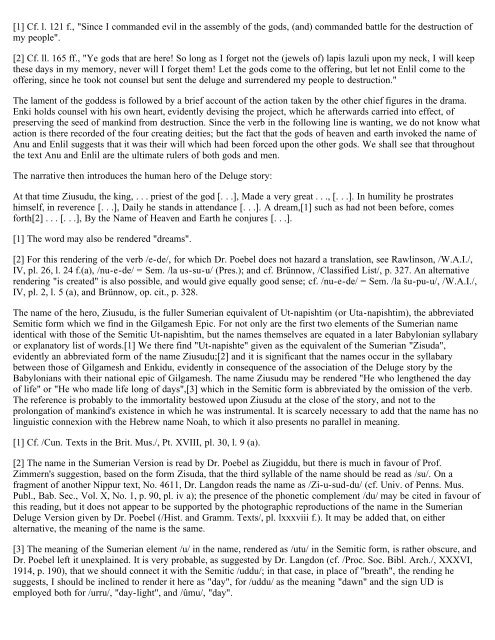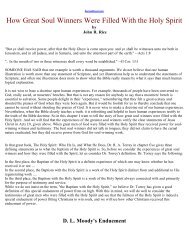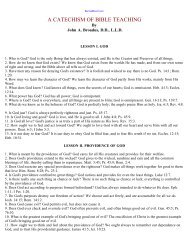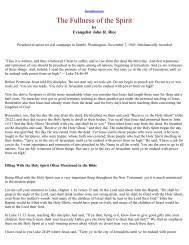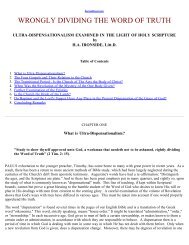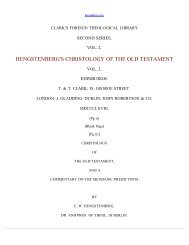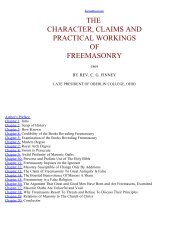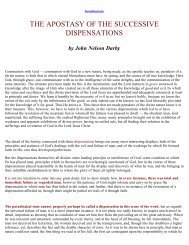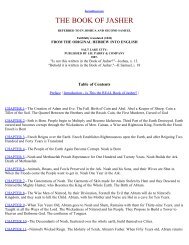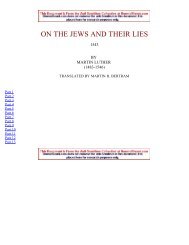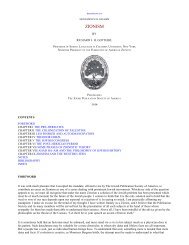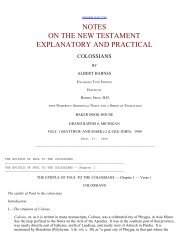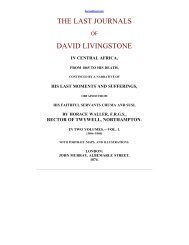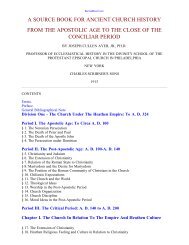Legends of Babylon and Egypt in Relation to Hebrew Tradition.pdf
Legends of Babylon and Egypt in Relation to Hebrew Tradition.pdf
Legends of Babylon and Egypt in Relation to Hebrew Tradition.pdf
You also want an ePaper? Increase the reach of your titles
YUMPU automatically turns print PDFs into web optimized ePapers that Google loves.
[1] Cf. l. 121 f., "S<strong>in</strong>ce I comm<strong>and</strong>ed evil <strong>in</strong> the assembly <strong>of</strong> the gods, (<strong>and</strong>) comm<strong>and</strong>ed battle for the destruction <strong>of</strong><br />
my people".<br />
[2] Cf. ll. 165 ff., "Ye gods that are here! So long as I forget not the (jewels <strong>of</strong>) lapis lazuli upon my neck, I will keep<br />
these days <strong>in</strong> my memory, never will I forget them! Let the gods come <strong>to</strong> the <strong>of</strong>fer<strong>in</strong>g, but let not Enlil come <strong>to</strong> the<br />
<strong>of</strong>fer<strong>in</strong>g, s<strong>in</strong>ce he <strong>to</strong>ok not counsel but sent the deluge <strong>and</strong> surrendered my people <strong>to</strong> destruction."<br />
The lament <strong>of</strong> the goddess is followed by a brief account <strong>of</strong> the action taken by the other chief figures <strong>in</strong> the drama.<br />
Enki holds counsel with his own heart, evidently devis<strong>in</strong>g the project, which he afterwards carried <strong>in</strong><strong>to</strong> effect, <strong>of</strong><br />
preserv<strong>in</strong>g the seed <strong>of</strong> mank<strong>in</strong>d from destruction. S<strong>in</strong>ce the verb <strong>in</strong> the follow<strong>in</strong>g l<strong>in</strong>e is want<strong>in</strong>g, we do not know what<br />
action is there recorded <strong>of</strong> the four creat<strong>in</strong>g deities; but the fact that the gods <strong>of</strong> heaven <strong>and</strong> earth <strong>in</strong>voked the name <strong>of</strong><br />
Anu <strong>and</strong> Enlil suggests that it was their will which had been forced upon the other gods. We shall see that throughout<br />
the text Anu <strong>and</strong> Enlil are the ultimate rulers <strong>of</strong> both gods <strong>and</strong> men.<br />
The narrative then <strong>in</strong>troduces the human hero <strong>of</strong> the Deluge s<strong>to</strong>ry:<br />
At that time Ziusudu, the k<strong>in</strong>g, . . . priest <strong>of</strong> the god [. . .], Made a very great . . ., [. . .]. In humility he prostrates<br />
himself, <strong>in</strong> reverence [. . .], Daily he st<strong>and</strong>s <strong>in</strong> attendance [. . .]. A dream,[1] such as had not been before, comes<br />
forth[2] . . . [. . .], By the Name <strong>of</strong> Heaven <strong>and</strong> Earth he conjures [. . .].<br />
[1] The word may also be rendered "dreams".<br />
[2] For this render<strong>in</strong>g <strong>of</strong> the verb /e-de/, for which Dr. Poebel does not hazard a translation, see Rawl<strong>in</strong>son, /W.A.I./,<br />
IV, pl. 26, l. 24 f.(a), /nu-e-de/ = Sem. /la us-su-u/ (Pres.); <strong>and</strong> cf. Brünnow, /Classified List/, p. 327. An alternative<br />
render<strong>in</strong>g "is created" is also possible, <strong>and</strong> would give equally good sense; cf. /nu-e-de/ = Sem. /la šu-pu-u/, /W.A.I./,<br />
IV, pl. 2, l. 5 (a), <strong>and</strong> Brünnow, op. cit., p. 328.<br />
The name <strong>of</strong> the hero, Ziusudu, is the fuller Sumerian equivalent <strong>of</strong> Ut-napishtim (or Uta-napishtim), the abbreviated<br />
Semitic form which we f<strong>in</strong>d <strong>in</strong> the Gilgamesh Epic. For not only are the first two elements <strong>of</strong> the Sumerian name<br />
identical with those <strong>of</strong> the Semitic Ut-napishtim, but the names themselves are equated <strong>in</strong> a later <strong>Babylon</strong>ian syllabary<br />
or explana<strong>to</strong>ry list <strong>of</strong> words.[1] We there f<strong>in</strong>d "Ut-napishte" given as the equivalent <strong>of</strong> the Sumerian "Zisuda",<br />
evidently an abbreviated form <strong>of</strong> the name Ziusudu;[2] <strong>and</strong> it is significant that the names occur <strong>in</strong> the syllabary<br />
between those <strong>of</strong> Gilgamesh <strong>and</strong> Enkidu, evidently <strong>in</strong> consequence <strong>of</strong> the association <strong>of</strong> the Deluge s<strong>to</strong>ry by the<br />
<strong>Babylon</strong>ians with their national epic <strong>of</strong> Gilgamesh. The name Ziusudu may be rendered "He who lengthened the day<br />
<strong>of</strong> life" or "He who made life long <strong>of</strong> days",[3] which <strong>in</strong> the Semitic form is abbreviated by the omission <strong>of</strong> the verb.<br />
The reference is probably <strong>to</strong> the immortality bes<strong>to</strong>wed upon Ziusudu at the close <strong>of</strong> the s<strong>to</strong>ry, <strong>and</strong> not <strong>to</strong> the<br />
prolongation <strong>of</strong> mank<strong>in</strong>d's existence <strong>in</strong> which he was <strong>in</strong>strumental. It is scarcely necessary <strong>to</strong> add that the name has no<br />
l<strong>in</strong>guistic connexion with the <strong>Hebrew</strong> name Noah, <strong>to</strong> which it also presents no parallel <strong>in</strong> mean<strong>in</strong>g.<br />
[1] Cf. /Cun. Texts <strong>in</strong> the Brit. Mus./, Pt. XVIII, pl. 30, l. 9 (a).<br />
[2] The name <strong>in</strong> the Sumerian Version is read by Dr. Poebel as Ziugiddu, but there is much <strong>in</strong> favour <strong>of</strong> Pr<strong>of</strong>.<br />
Zimmern's suggestion, based on the form Zisuda, that the third syllable <strong>of</strong> the name should be read as /su/. On a<br />
fragment <strong>of</strong> another Nippur text, No. 4611, Dr. Langdon reads the name as /Zi-u-sud-du/ (cf. Univ. <strong>of</strong> Penns. Mus.<br />
Publ., Bab. Sec., Vol. X, No. 1, p. 90, pl. iv a); the presence <strong>of</strong> the phonetic complement /du/ may be cited <strong>in</strong> favour <strong>of</strong><br />
this read<strong>in</strong>g, but it does not appear <strong>to</strong> be supported by the pho<strong>to</strong>graphic reproductions <strong>of</strong> the name <strong>in</strong> the Sumerian<br />
Deluge Version given by Dr. Poebel (/Hist. <strong>and</strong> Gramm. Texts/, pl. lxxxviii f.). It may be added that, on either<br />
alternative, the mean<strong>in</strong>g <strong>of</strong> the name is the same.<br />
[3] The mean<strong>in</strong>g <strong>of</strong> the Sumerian element /u/ <strong>in</strong> the name, rendered as /utu/ <strong>in</strong> the Semitic form, is rather obscure, <strong>and</strong><br />
Dr. Poebel left it unexpla<strong>in</strong>ed. It is very probable, as suggested by Dr. Langdon (cf. /Proc. Soc. Bibl. Arch./, XXXVI,<br />
1914, p. 190), that we should connect it with the Semitic /uddu/; <strong>in</strong> that case, <strong>in</strong> place <strong>of</strong> "breath", the rend<strong>in</strong>g he<br />
suggests, I should be <strong>in</strong>cl<strong>in</strong>ed <strong>to</strong> render it here as "day", for /uddu/ as the mean<strong>in</strong>g "dawn" <strong>and</strong> the sign UD is<br />
employed both for /urru/, "day-light", <strong>and</strong> /ûmu/, "day".


